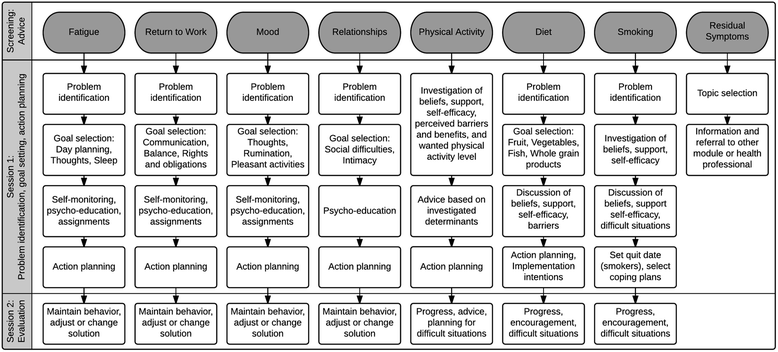The Kanker Nazorg Wijzer (Cancer Aftercare Guide) protocol: the systematic development of a web-based computer tailored intervention providing psychosocial and lifestyle support for cancer survivors
- PMID: 26260318
- PMCID: PMC4532144
- DOI: 10.1186/s12885-015-1588-z
The Kanker Nazorg Wijzer (Cancer Aftercare Guide) protocol: the systematic development of a web-based computer tailored intervention providing psychosocial and lifestyle support for cancer survivors
Abstract
Background: After primary treatment, many cancer survivors experience psychosocial, physical, and lifestyle problems. To address these issues, we developed a web-based computer tailored intervention, the Kanker Nazorg Wijzer (Cancer Aftercare Guide), aimed at providing psychosocial and lifestyle support for cancer survivors. The purpose of this article is to describe the systematic development and the study design for evaluation of this theory and empirical based intervention.
Methods/design: For the development of the intervention, the steps of the Intervention Mapping protocol were followed. A needs assessment was performed consisting of a literature study, focus group interviews, and a survey study to get more insight into cancer survivors' health issues. This resulted in seven problem areas that were addressed in the intervention: cancer-related fatigue, return to work, anxiety and depression, social relationships and intimacy, physical activity, diet, and smoking. To address these problem areas, the principles of problem-solving therapy and cognitive behavioral therapy are used. At the start of the intervention, participants have to fill in a screening questionnaire. Based on their answers, participants receive tailored advice about which problem areas deserve their attention. Participants were recruited from November 2013 through June 2014 by hospital staff from 21 hospitals in the Netherlands. Patients were selected either during follow-up visits to the hospital or from reviews of the patients' files. The effectiveness of the intervention is being tested in a randomized controlled trial consisting of an intervention group (n = 231) and waiting list control group (n = 231) with a baseline measurement and follow-up measurements at 3, 6, and 12 months.
Discussion: Using the Intervention Mapping protocol resulted in a theory and evidence-based intervention providing tailored advice to cancer survivors on how to cope with psychosocial and lifestyle issues after primary treatment.
Trial registration: Dutch Trial Register NTR3375.
Figures
References
-
- The Dutch Cancer Society . Kanker in Nederland tot 2020: trends en prognoses [Cancer in the Netherlands up to 2020: trends and prognoses] Amsterdam: KWF Kankerbestrijding; 2011.
-
- Mehnert A, Koch U. Psychological comorbidity and health-related quality of life and its association with awareness, utilization, and need for psychosocial support in a cancer register-based sample of long-term breast cancer survivors. J Psychosom Res. 2008;64(4):383–391. - PubMed
-
- Simard S, Thewes B, Humphris G, Dixon M, Hayden C, Mireskandari S, et al. Fear of cancer recurrence in adult cancer survivors: a systematic review of quantitative studies. J Canc Surviv. 2013;7(3):300–322. - PubMed
-
- Prue G, Rankin J, Allen J, Gracey J, Cramp F. Cancer-related fatigue: a critical appraisal. Eur J Cancer. 2006;42(7):846–863. - PubMed
-
- Duijts SF, van Egmond MP, Spelten E, van Muijen P, Anema JR, van der Beek AJ. Physical and psychosocial problems in cancer survivors beyond return to work: a systematic review. Psychooncology. 2014;23(5):481–492. - PubMed
Publication types
MeSH terms
Associated data
LinkOut - more resources
Full Text Sources
Other Literature Sources





